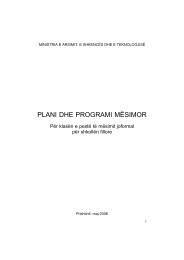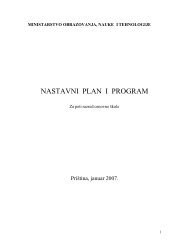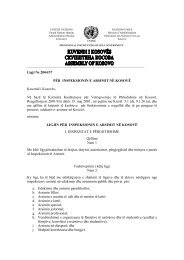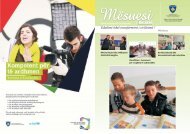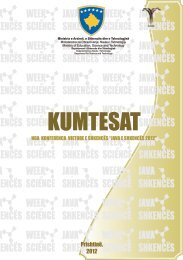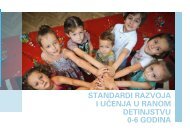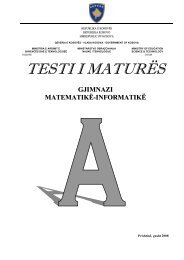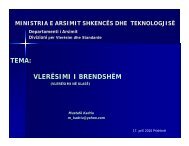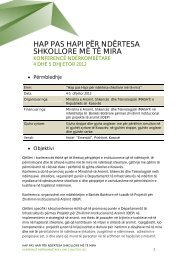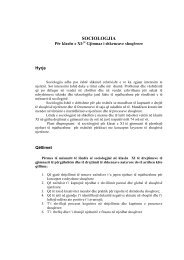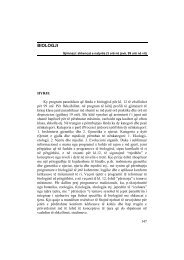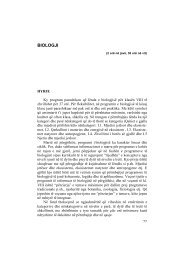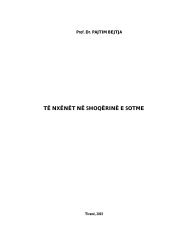Humboldt Kosmos 90/2007: Wissen schafft Entwicklung
Humboldt Kosmos 90/2007: Wissen schafft Entwicklung
Humboldt Kosmos 90/2007: Wissen schafft Entwicklung
Erfolgreiche ePaper selbst erstellen
Machen Sie aus Ihren PDF Publikationen ein blätterbares Flipbook mit unserer einzigartigen Google optimierten e-Paper Software.
<strong>Wissen</strong> <strong>schafft</strong> <strong>Entwicklung</strong> | || From Knowledge to Development<br />
ZAHleN uND FAkteN<br />
Über die Bewerbungen im Georg Forster-Programm entscheidet<br />
ein eigener interdisziplinärer Auswahlausschuss,<br />
dem derzeit acht <strong>Wissen</strong>schaftler aus Deutschland angehören.<br />
Die Erfolgsquote der Bewerber liegt bei 33 Prozent.<br />
Die Zahl der jährlich vergebenen Stipendien konnte über<br />
die Jahre hinweg kontinuierlich erhöht werden. Während in<br />
den ersten Jahren zwischen 25 und 35 Stipendien vergeben<br />
wurden, waren es zuletzt bis zu 60 Forschungsstipendien pro<br />
Jahr. Bis Ende <strong>2007</strong> wurden insgesamt 396 Stipendiaten aus<br />
64 Ländern ausgewählt, der Frauenanteil liegt bei 21 Prozent.<br />
Geisteswissenschaftler machen etwa 23 Prozent der Stipendiaten<br />
aus, die Ingenieurwissenschaftler 10 Prozent und die<br />
Naturwissenschaftler 67 Prozent. Innerhalb der Naturwissenschaften<br />
sind die Lebenswissenschaftler mit 27 Prozent<br />
überproportional vertreten. Besonders auffällig ist der relativ<br />
hohe Prozentsatz von Agrar- (12 Prozent) und Geowissenschaftlern<br />
(8 Prozent), der auf die besondere Relevanz<br />
dieser Fächer für die Forschung in <strong>Entwicklung</strong>sländern<br />
zurückzuführen ist.<br />
Die Herkunftsländer verteilen sich über alle Kontinente<br />
mit einem leichten Schwerpunkt in Afrika. An der Spitze<br />
liegt mit weitem Abstand Nigeria, gefolgt von Bangladesch,<br />
Kamerun, Brasilien und Iran.<br />
kanischen Ländern. Acht der rund 30 Teilnehmer waren Georg<br />
Forster-Forschungsstipendiaten. In den nächsten Jahren soll der<br />
Kurs auch für <strong>Wissen</strong>schaftler aus Südostasien und Lateinamerika<br />
angeboten werden. Für die <strong>Humboldt</strong>-Stiftung ist dieser Kurs nur<br />
ein erster Schritt. In den nächsten Jahren soll den Georg Forster-<br />
Stipendiaten ein vielseitiges Fortbildungsprogramm angeboten<br />
werden, das vom Proposal Writing über Finanz- und Projektmanagement<br />
bis zum Fakultätsmanagement reicht. Auf diese Weise<br />
sollen die Georg Forster-Stipendiaten noch besser auf Führungsaufgaben<br />
in ihren Heimatländern vorbereitet werden. n<br />
Dr. des. Felix Streiter ist Referatsleiter in<br />
der Abteilung Förderung und Netzwerk der<br />
<strong>Humboldt</strong>-Stiftung und verantwortlich für das<br />
Georg Forster-Programm.<br />
FActS AND FiGuReS<br />
Decisions on applications to the Georg Forster Programme<br />
are taken by the Foundation’s own interdisciplinary selection<br />
committee which currently comprises eight academics from<br />
Germany. The success rate is 33 percent. Over the years,<br />
the number of fellowships granted annually has continually<br />
increased. Whereas in the first years, between 25 and 35<br />
fellowships were awarded, in the last years, the number has<br />
grown to 60 per year. By the end of <strong>2007</strong>, 396 fellows from 64<br />
countries will have been selected; the percentage of women<br />
was 21percent.<br />
Humanities scholars account for 23 percent of fellows, 10<br />
percent are engineers and 67 percent scientists. Amongst<br />
the scientists, the life sciences dominate at 27 percent. What<br />
is especially noticeable is the relatively high percentage of<br />
agrarian scientists (12 percent) and geoscientists (8 percent)<br />
which reflects the particular relevance of these subjects to<br />
research in developing countries.<br />
The countries of origin are spread across all the continents<br />
with a slight emphasis on Africa. Nigeria is far and away the<br />
leader, followed by Bangladesh, Cameroon, Brazil und Iran.<br />
was just the first step. In the next few years, Georg Forster Fellows<br />
will be offered a multifaceted further education programme<br />
ranging from proposal writing via finance and project management<br />
to departmental management. In this way, Georg Forster<br />
Fellows will be even better prepared for leadership tasks in their<br />
own countries. n<br />
Dr. des. Felix Streiter heads a section in the<br />
<strong>Humboldt</strong> Foundation’s Sponsorship and Network<br />
Department and is responsible for the<br />
Georg Forster Programme.<br />
WiR BRAucHeN eiNeN eHReNkoDex<br />
Der nigerianische linguist Bassey Antia und der deutsche<br />
Wirtschaftswissenschaftler Michael kirk im Gespräch über<br />
gegenseitiges lernen und wissenschaftliches Fair Play zwischen<br />
Nord und Süd sowie Projekte, die das Versprechen<br />
der Nachhaltigkeit wirklich einlösen.<br />
kosmos: Herr Professor Antia, Sie vergleichen Gesundheitskampagnen<br />
in Deutschland und Nigeria. Ihre Erkenntnisse sollen<br />
helfen, Krankheiten wie Aids besser zu bekämpfen. Wo liegen die<br />
Unterschiede zwischen den beiden Ländern?<br />
Antia: Anti-AIDS-Kampagnen in Nigeria betonen vor allem<br />
das Bedrohliche der Krankheit. Die Deutschen zeigen eher, mit<br />
welchen Mitteln man vorbeugt. Psychologisch und kommunikationswissenschaftlich<br />
betrachtet, kann leider keiner der beiden<br />
Ansätze Erfolg garantieren. Eine Synthese aus beiden Strategien<br />
wäre wirksamer, man könnte voneinander lernen.<br />
kosmos: Aus deutscher Sicht ist das eine ungewohnte Perspektive.<br />
Schließlich gelten afrikanische Staaten im Kampf gegen Aids<br />
nicht als Vorbilder, sondern eher als Hilfsbedürftige, die mit dem<br />
Problem alleine nicht fertig werden …<br />
We NeeD A coDe oF HoNouR<br />
Nigerian linguist, Bassey Antia, and German economist,<br />
Michael kirk, talk about learning from one another, northsouth<br />
scientific fair play, and projects that really keep their<br />
promise of sustainability.<br />
kosmos: Professor Antia, you are comparing health campaigns in<br />
Germany and Nigeria, and your findings are supposed to contribute<br />
to improving the fight against diseases like AIDS. What are<br />
the differences between the two countries?<br />
Antia: In Nigeria, AIDS messaging largely emphasises the threat<br />
of the disease. The Germans tend to focus on the preventive<br />
resources. Regrettably, from the standpoint of the health psychology<br />
and communication theory being used, neither approach can<br />
guarantee much success. A synthesis of the two strategies would<br />
be more effective; we could learn from one another.<br />
kosmos: From the German standpoint, this is an unusual way<br />
of looking at things. After all, African states are not usually portrayed<br />
as role models in the battle against AIDS, but rather as the<br />
help-seekers who can’t cope with the problem on their own …<br />
14 <strong>Humboldt</strong> kosmos Sonderausgabe 2008<br />
15<br />
Interview<br />
<strong>Wissen</strong> <strong>schafft</strong> <strong>Entwicklung</strong> | || From Knowledge to Development<br />
Interview



